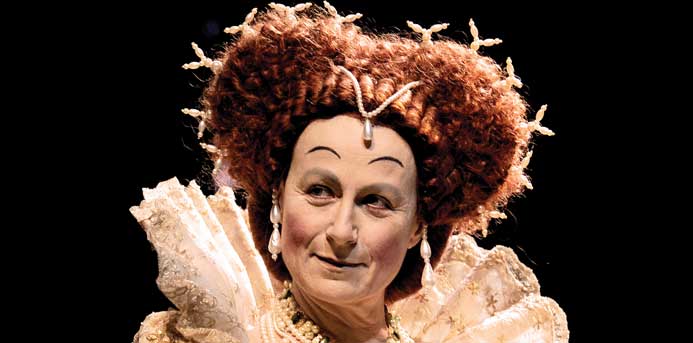Women pay a price for power.
For Elizabeth I, that price was the permission to love—and therefore be human—according to playwright Timothy Findley, who spun this fictional story out of a historical fact: The night before the beheading of her court favorite and rumored lover, the Earl of Essex, Elizabeth was entertained by Shakespeare’s company of actors.
In Findley’s play, Elizabeth distracts herself by visiting the actors in their barn, where she argues with the actor Ned Lowenscroft, who is famous for playing Shakespeare’s women and is dying a tortured death of syphilis. Both characters have lost their lovers. One is condemned to death; the other condemned to life. Ned teaches Elizabeth how to feel the loss of her love, since she has “killed the woman inside so that England may prevail,” as she says. We see many sides of Elizabeth—her hatred for men, as well as her gentleness—all the way through to the play’s climax: the beheading.
Findley’s script is full of memorable lines that let us learn about Elizabeth, from her “tough bitch” image to her inner motivations. When Elizabeth learns that Ned is dying, she tells him, “Life kills. That is its purpose.” Later, she declares, “If I could kill every man in this country, I would. There is not one that’s worthy of this moment.” Most of all, she despises her philandering father, Henry VIII: “There was no England in him.”
It’s a particular thrill to watch these killer lines be delivered by Diane D’Aquila, who originated the role in the play’s award-winning debut at the Stratford Shakespeare Festival in Ontario. Under the direction of Chicago Shakespeare Theater Artistic Director and Founder Barbara Gaines, D’Aquila’s is one of several stellar performances: the tender and irreverent Ned is played impeccably by Steven Sutcliffe, a veteran of Canada’s Shaw Festival who appeared in “Ragtime” on Broadway, longtime CST collaborator Kevin Gudahl plays a thoughtful Shakespeare, and Chicago actress Mary Ann Thebus is endearing and entertaining as the acting company’s seamstress. Andrew Rothenberg is well cast as the resident playboy, the Irishman Jack.
And, of course, the Elizabethan costumes are enchanting—although, we only see Elizabeth in one fantastic white and gold number, with numerous strands of pearls swinging over her bodice. In the second act, she wears a less-fancy costume that belongs to Shakespeare’s actors and sheds her bone-white powder, mid-forehead eyebrows and red wig, with dramatic results.
Though some might find Findley’s text a bit heavy-handed, it’s easy to believe that it was as difficult to be a woman leader in the 16th century as it is today, walking the fine line between not appearing womanly while not behaving quite like a man either. As Elizabeth stingingly puts it: “I shall die of regret … for never having been myself.”
“Elizabeth Rex” plays at Chicago Shakespeare Theater through January 22, 2012. For tickets, call 312-595-5600 or visit chicagoshakes.com/

